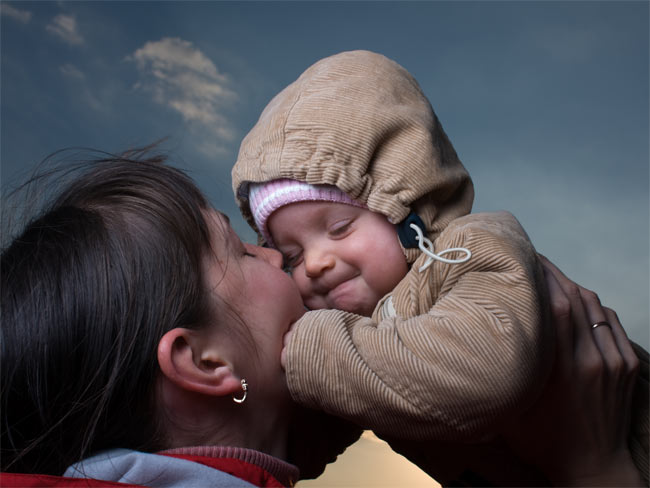Good Mothering Soothes Babies Born to Be Fussy

For babies, a nurturing environment can ease the effects of a family history of depression, according to a study of adopted infants.
The study, published in the September issue of the journal Developmental Psychology, found that adopted babies whose birth mothers had depression were more prone to fussiness than babies without a family history of depression — but only when the adoptive moms weren't responsive to the babies' needs. Good parenting seemed to overcome the risk presented by the child's genetic inheritance.
"These findings reconfirm the idea that development is malleable," study co-author Misaki Natsuaki, a psychologist at the University of California, Riverside, wrote in an e-mail to LiveScience.
Nature vs. nurture
Researchers have long known that depression is partially hereditary, but the way parents treat their kids also has a major effect on the children's emotional state.
Teasing out the differences between nature (the child's genes) and nurture (the child's environment) is difficult when parents and kids are biologically related. So Natsuaki and her team turned to a powerful tool in social science research: adoptive families. In families that adopt a child who isn't biologically related, genes and environment come from different sources. That allows researchers to analyze nature and nurture separately.
The researchers collected data on 281 families, each consisting of a mother and father and an adopted infant, plus the child's birth mother. They asked the adoptive parents about the baby's fussiness, which gave them insight into the child's emotional distress. The adoptive parents also filled out psychological questionnaires designed to measure depression symptoms.
Sign up for the Live Science daily newsletter now
Get the world’s most fascinating discoveries delivered straight to your inbox.
The researchers also gathered data on whether the birth mothers had depression. Finally, a trained observer watched the parents interact with their adopted child at 9 months of age to determine how responsive the parents were to the child's needs.
Nine months later, when the babies were 18 months old, the researchers again evaluated children’s level of fussiness.
Responsive moms
Of the adoptive moms, the ones who had the most depression symptoms when the infant was 9 months old were the most likely to be faced with a fussy baby nine months later, the researchers found. That shows that environmental factors can affect a child's emotional development, Natsuaki said.
In babies whose birth moms had depression — babies who, because of their biological family history, were at higher risk for the disorder themselves — the environment mattered, too. When adoptive moms were unresponsive to at-risk babies (failing to give the child positive feedback or comfort them when needed, for example), the babies were likely to be fussy nine months later.
But when adoptive moms were responsive, those babies showed no more fussiness than if they'd never had a genetic risk at all.
"A child may inherit a tendency to develop depression," Natsuaki told LiveScience, "but these findings suggest that this tendency will not develop into emotional distress when the environment that the child is reared in is responsive to the child's needs."
Dads' responsiveness showed a similar effect, but the results were not statistically significant. That could be because the time young children spend with their fathers is typically 60 percent to 80 percent of the time they spend with their mothers, the researchers wrote.
Psychologist Matthew McGue of the University of Minnesota, who was not involved in the study, said the research meshes with an earlier study showing that teenage children of depressed adoptive mothers were more likely to be depressed than teens with healthy adoptive moms. Future studies will be needed to understand how fussiness in infancy relates to depression and other emotional problems later in life, he said.
Natsuaki said the researchers hope such studies eventually will explain how depression is passed from generation to generation.
"Understanding how genetic and environmental factors work together to influence a child's risk of depression will increase our ability to design effective prevention strategies," she wrote.
- Top 10 Controversial Psych Disorders
- 10 Things You Didn't Know About the Brain
- 7 Thoughts That are Bad For You

Stephanie Pappas is a contributing writer for Live Science, covering topics ranging from geoscience to archaeology to the human brain and behavior. She was previously a senior writer for Live Science but is now a freelancer based in Denver, Colorado, and regularly contributes to Scientific American and The Monitor, the monthly magazine of the American Psychological Association. Stephanie received a bachelor's degree in psychology from the University of South Carolina and a graduate certificate in science communication from the University of California, Santa Cruz.
Man gets sperm-making stem cell transplant in first-of-its-kind procedure
'Love hormone' oxytocin can pause pregnancy, animal study finds










